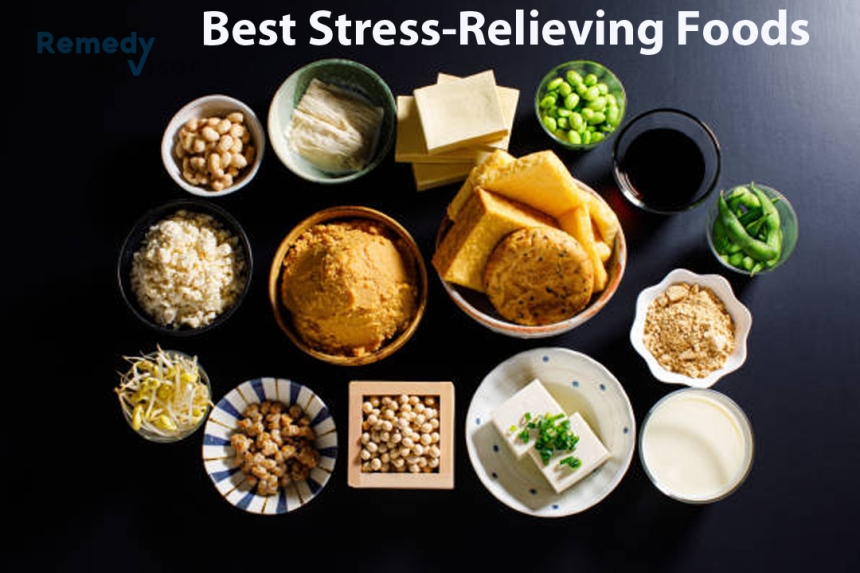There’s stress, and then there’s STRESS. There’s the chronic stress you encounter when you’re doomed to listen to your husband suck his teeth till death (or divorce) do you part.
And then there’s acute stress, the type we all encounter every once in a while: Tomorrow you’re making your first speech to 2,000 nitpickologists your boss is doing his best George Steinbrenner imitation and you have to fly across country, relying on a pilot who just may have been last in his class at flight-training school.
Do days like these have you nibbling on your nails? Try something tastier. Like food.
Nutrition experts say the right food at the right time can help you live with even relieve the stress modern life dumps at your door as regularly and plentifully as junk mail.
Brain chemicals that outsmart stress
Perhaps no one knows this better than Judith Wurtman, Ph.D., a researcher at the Massachusetts Institute of Technology who has written a book on the subject called Managing Your Mind and Mood through Food. Dr. Wurtman’s program is based on eating the foods that promote the brain’s production of three mood-altering neurotransmitters, brain chemicals that pass information from brain cell to brain cell. The three are called dopamine, norepinephrine and serotonin, and here’s what they do.
Dopamine and norepinephrine are the energizers. Your brain manufactures them from the amino acid tyrosine, which is found in protein foods. Serotonin acts either as a tranquilizer or an aid to concentration, depending on the time of day it’s present in the brain. Carbohydrates encourage serotonin production by increasing the brain’s supply of the amino acid tryptophan.
(Note: Don’t take tyrosine and tryptophan in pill form, Dr. Wurtman warns. You could develop some potentially harmful side effects: Tyrosine could alter blood pressure, tryptophan can cause extreme drowsiness, and each can block the other essential amino acids from getting to your brain.)
Dr. Wurtman’s research shows more than which foods produce which brain chemicals she’s discovered exactly which foods to eat to create the brain chemistry that can help counter specific types of stress.
Preparing for “scheduled” stress
What should you do when you know ahead of time that you’re going to be under stress? That meeting. That speech. That exam. That interview. You need to be alert but not nervous. You have to think fast, not frenetically. Here are some pre performance hints from Dr. Wurtman.
Make it light
This means low in calories, carbohydrates and fat. Favor low-fat protein foods like lean meats or fish. This will ensure a high level of brain-energizing neurotransmitters.
Normalize your body’s caffeine level
Don’t go cold turkey to avoid the jitters: Drink what you typically drink or you’ll end up with withdrawal symptoms like headache and fatigue. And if you normally don’t use caffeine, don’t try it as a special pick-me-up. You’ll be so “up” they’ll have to scrape you off the ceiling.
Use little or no alcohol on the big day
If social circumstances seem to dictate that you must have a drink, make sure you’re a teetotaler for at least 3 hours before your performance.
Time your meal
If you can, eat about 2 hours before the big event to ensure that the part of digestion that takes blood away from your brain will be completed.
Don’t try to perform on an empty stomach
Hunger is distracting, and when combined with tension it may make you feel queasy or give you a headache.

Dealing with sudden stress
All this is fine when stress is on schedule. But what do you do when it arrives unannounced?
Eat everything you always wanted to. Candy, cookies, pie, cake, ice cream, jams, syrup, soft drinks, crackers (or, if you’re feeling virtuous, rice, potatoes and corn). We’re talking calming carbohydrates here, which is probably the exact kind of food you’ll be craving anyway.
“Nature has a way of guiding us to sweets and starches when we are feeling stressed,” says Dr. Wurtman. “The right food at the right time in the right amount is as effective as a tranquilizer.”
There is, however, a serious, important method to this delicious madness.
- You need to be on a well-balanced diet.
- If you have any serious mental or physical problems, this program won’t cure them. If you are hypoglycemic (have a tendency toward low blood sugar), Dr. Wurtman advises that you get your doctor’s okay before following her program. If you’re a diabetic, don’t use the program at all.
- The program is for short-term use only.
- No pigging out. You’ll just put on weight, Dr. Wurtman warns. “It’s always the first one or two cookies that initiate the production of serotonin,” she says. (Serotonin, remember, is the brain chemical that produces the calming effect.)
And here’s some other antianxiety advice.
For the first response, eat your carbohydrates with as little protein as possible, because protein can impede the production of serotonin. Digestion has to take place before serotonin is produced. For speedy digestion, stay away from fat, which slows the process.
You also need to be selective about the kinds of carbohydrates you eat. Eating fructose (found in fruit) won’t cause the changes in your blood that lead to serotonin production. You want carbs that change as fast as Clark Kent changes into Superman; those foods take an hour getting out of the phone booth. Dr. Wurtman also says that leafy greens and bright-colored vegetables don’t supply enough carbohydrates to activate serotonin production.
So it’s devil’s food cake and Fig Newtons. But not the whole cake and not the whole box. Just 30 grams or 14% ounces of pure carbohydrate. “That’s 2 ounces of gumdrops, 3 ounces of jelly beans, or 2 cups of Cheerios,” Dr. Wurtman says gleefully. Or 1 Sara Lee yellow cupcake, 2 fudgsicles, 6 gingersnaps, 10 vanilla wafers, 16 animal crackers. Don’t let your conscience be your guide.
And if you’re overweight, you may need more sweets and starchy foods, because the extra fat in your fat cells slows down the carbohydrate-to serotonin process. You may need up to a 2-ounce dose of pure carbo. It is not necessary to eat more than the prescribed dose. As with medicine, the correct dose will make the stress go away.
How fast does it work? This is medicine, and that means fast relief: about 20 minutes. Dr. Wurtman says the most effective way to get carbohydrates into your system is to drink them and she doesn’t mean alcohol. Try putting 2 tablespoons of sugar into a cup of herb tea. Or sip instant cocoa made with water or skim milk. Or grab a can of regular soda.
A few more words to the wired
- Eat your carbo tranquilizer in a calm setting.
- Eat or drink slowly. No wolfing or gulping. You’ll eat or drink too much.
- Take a few minutes to do something relaxing while you take your carbo fix, Dr. Wurtman says. “This helps boost the mood-altering effects of serotonin as it is being synthesized in your brain.”







